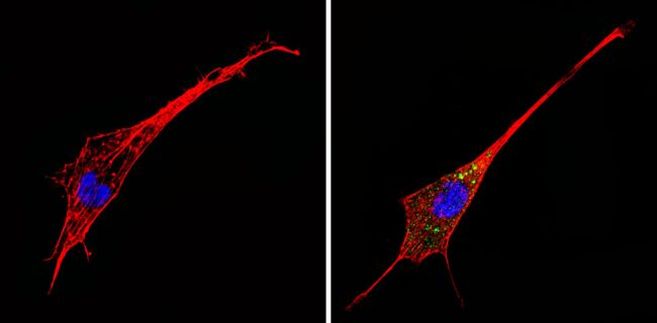Now live! RTHM Direct – simplified medication access for Long COVID, ME/CFS and related conditions. Check it out
Muscarinic Cholinergic M3 Receptor (M3-R) is widely expressed in various tissues, with prominent roles in mediating smooth muscle contraction (e.g., bronchial and gastrointestinal muscles) and stimulating glandular secretion, especially in the salivary and lacrimal glands. Activation of M3-R leads to increased intracellular calcium.
M3 Muscarinic Receptors (M3 mAChR), like M1 receptors, primarily couple to Gq/11 proteins, activating the PLC pathway, leading to increased intracellular calcium levels and PKC activation. M3 receptors are involved in smooth muscle contraction and glandular secretion among other functions.
Functions of the Muscarinic Cholinergic M3 Receptor (M3-R)
The M3 muscarinic cholinergic receptor is another subtype of the muscarinic acetylcholine receptors (M1-M5). Like its counterparts, it is activated by the neurotransmitter acetylcholine. The M3 receptor is primarily found in smooth muscles, exocrine glands, and certain areas of the central nervous system. Below is a summary of its main functions:
Smooth Muscles
- Bronchoconstriction: Activation of M3 receptors in the bronchial smooth muscles can lead to bronchoconstriction, which is particularly relevant in conditions like asthma.
- Gastrointestinal Tract Motility: Stimulation of M3 receptors increases the contractility of the gastrointestinal smooth muscles, promoting motility.
- Miosis: Constriction of the pupil in the eye due to the contraction of the sphincter pupillae muscle.
- Accommodation: Change in the shape of the lens for near vision.
- Vasodilation: While acetylcholine generally leads to endothelium-dependent vasodilation, this is primarily mediated through the release of nitric oxide (NO) from endothelial cells after M3 receptor activation.
Exocrine Glands
- Increased Secretions: Activation of M3 receptors in various exocrine glands (like salivary, lacrimal, and gastric glands) stimulates secretion. For example, it promotes saliva production in the salivary glands and acid secretion in the stomach.
Central Nervous System
- While M3 receptors are present in the CNS, their specific roles are more complex and less well-defined compared to their peripheral functions.
Given the M3 receptor’s role in smooth muscle contraction and glandular secretion, drugs affecting its activity can have various therapeutic implications. For instance, anticholinergic drugs that block the M3 receptor can reduce bronchoconstriction in asthma or COPD or decrease overactive bladder contractions. However, they might also lead to side effects like dry mouth due to reduced salivary secretion.
Autoantibodies to Muscarinic Cholinergic M3 Receptor (M3-R)
There is evidence of autoantibodies to the Muscarinic Cholinergic M3 Receptor (M3-R) in certain autoimmune and complex diseases. However, more research is needed to fully understand the role of these autoantibodies and their potential as diagnostic markers and therapeutic targets.
Autoimmune Conditions
There is evidence to suggest that autoantibodies to the Muscarinic Cholinergic M3 Receptor (M3-R) are present in certain autoimmune diseases, such as Sjögren’s syndrome and systemic sclerosis. These autoantibodies can affect the function of the M3-R and contribute to the symptoms of these diseases, including dry mouth and eyes, as well as gastrointestinal dysmotility. However, more research is needed to fully understand the role of these autoantibodies and their potential as diagnostic markers and therapeutic targets. (Sumida et al. 2014) (Tsuboi et al. 2014) (Sumida et al. 2010) (Kawaguchi et al. 2009) (Tsuboi et al. 2011) (Kumar et al. 2017) (Hatipoglu et al. 2023)
Myalgic Encephalomyelitis/Chronic Fatigue Syndrome
In the context of Myalgic Encephalomyelitis/Chronic Fatigue Syndrome (ME/CFS), it’s hypothesized that autoantibodies against M3-R could contribute to the disease’s pathophysiology. Autoantibodies to Muscarinic Cholinergic M3 Receptor (M3-R) have been found to be increased in patients with Myalgic Encephalomyelitis/Chronic Fatigue Syndrome (ME/CFS). A study conducted in Sweden investigated the levels of autoantibodies in plasma and cerebrospinal fluid (CSF) samples from ME/CFS patients and healthy controls. The study found significant increases in autoantibody levels to M3 and M4 receptors in ME/CFS patients compared to controls. However, the role of these autoantibodies in the pathogenesis of ME/CFS is still uncertain, and further research is needed to evaluate their clinical significance. (Bynke et al. 2021)
Dysautonomia and Postural Orthostatic Tachycardia Syndrome
Autoantibodies against G protein-coupled receptors (GPCR), including muscarinic cholinergic M3 receptor (M3-R), have been implicated in autoimmune diseases as well as dysautonomia, specifically postural orthostatic tachycardia syndrome (POTS). A recent study showed a significant association between the serum level of anti-muscarinic acetylcholine receptor antibodies and gastrointestinal symptoms and their severity in those with POTS. (Sunami et al. 2022)
Learn more about autoantibody testing at “RTHM Lab Now Offering GPCR+ Autoantibody Panel” and visit our Lab Page to order your GPCR+ Antibody Panel today.
Featured image courtesy of RSCB Protein Data Bank

Get updates
Join our mailing list



